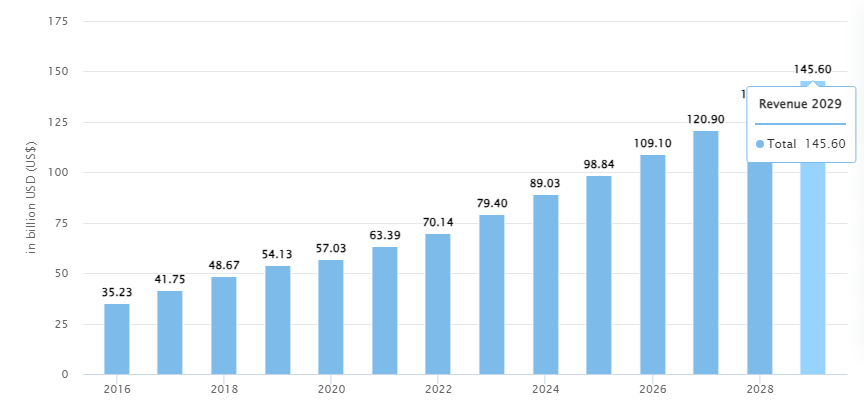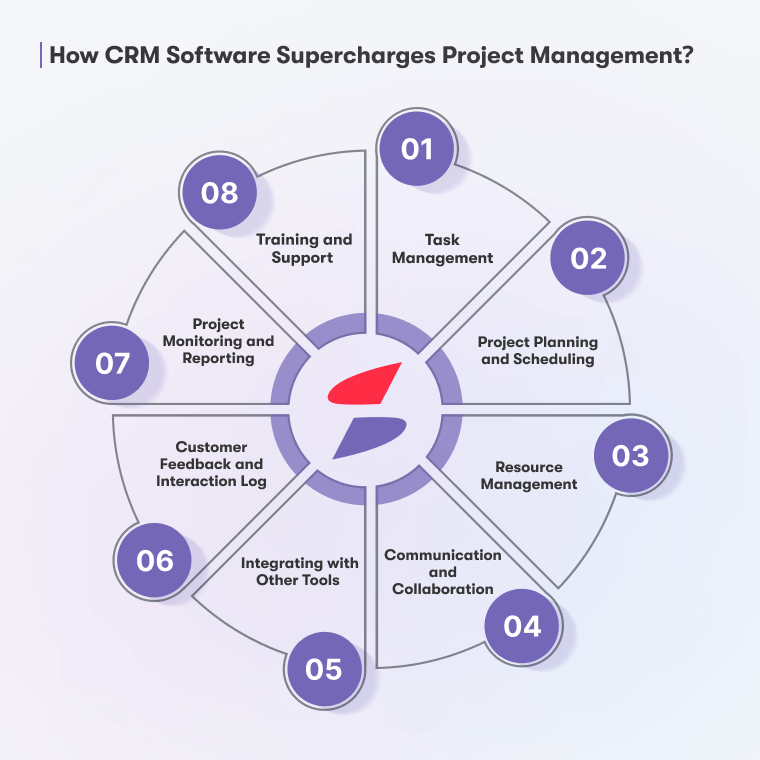Quick Summary
Effectively managing customer relationships and projects is crucial. By implementing a CRM for project management, you can streamline two of your business’s key functions and ensure smooth execution. This not only saves time but also provides a centralized system to track all your business activities efficiently.
Introduction
Many companies have strong project management teams, but their potential is often underutilized due to overwhelming amounts of data and a lack of clear customer insights. This can hinder growth, but there’s a solution.
It is very much evident that CRM systems are in a very advanced stage, offering almost all features in implementations. With the right CRM, you will document what you want from any department in just seconds. As the demand for integrated data and CRM solutions is high, the CRM Market is projected to have an annual growth rate of 10.34% from 2024 to 2029.

(Source: Statista)
Improving decision-making, data transparency, and enabling customer satisfaction for final business success all can be achieved by spreading a customer-oriented approach through the entire business sphere with the assistance of CRM systems.
How can CRM-oriented Project Management software accelerate your business growth? Keep reading!
What is CRM in Project Management?
Integrating CRM with project management combines customer relationship management software with project management processes. This integration provides support not only to current users but also to potential future users, stakeholders, and team members throughout the project. By using CRM software, you can streamline operations and enhance team collaboration.
A CRM system centralizes essential data about clients, projects, and team activities, giving you instant access to everything you need. Additionally, many CRM platforms offer task management, reporting, and analytics features, reducing the need for manual work.
Incorporating CRM into project management improves communication, collaboration, and client relationships. It’s a versatile tool that helps you stay organized, focused, and on track to achieve project goals within deadlines and to meet client expectations.
Why Does Every Project Management Team Need a CRM?
CRM project management is a good game-changer for your business. According to WebFX, up to 13% of companies have already invested in and used this platform so far, with as much significant sales growth. This therefore points out the fact that adopting CRM project management helps streamline client interaction and improves project workflows.
Let’s take a closer look at why CRM is considered such a game-changer.
Improved Customer Satisfaction
A report from WebFX claims that 74% of organizations having CRM use reported to have a good access to customer information. This shows that mergers of CRM and project management will ensure full satisfaction of the customer needs and expectations during the period under the project.
With both combined, client comments and interactions can now be captured in real-time, and you can immediately adjust and make amends for their needs. This leads to a higher level of client satisfaction because clients consider themselves important and valued. On the other side, CRM systems support individual communication that creates trust and deeper relationships. Happy customers are likely to stick by you and recommend others to your business.
Optimized Operations
The CRM streamlines both the tools and systems necessary to manage projects as well as customer data. By integrating these functions, you avoid unnecessary steps and the possibility of errors associated with them, making everything much easier to handle. With a single system, it is easy to plan, execute, monitor, and report on project activities.
Simplifying the processes would make your team efficient enough to carry out the tasks in due time, with a better concentration on what matters. This efficiency as an improvement in productivity also supports cost savings in wastage on repetitive tasks and lots of data entry handled manually.
Improved Collaboration and Communication
With CRM project management, you ensure that all project information is well-organized and easily accessible to all team members. This centralized system enhances communication, as everyone stays aligned with the project’s progress. It allows your team to share information, exchange ideas, resolve issues, and coordinate tasks in real-time, reducing miscommunication and saving time. This leads to clear communication, ensures objectives are understood and met, and keeps the team’s actions aligned with project goals.
Comprehensive View of Project and Customer Data
CRM project management offers a comprehensive view of both your projects and customer data—something traditional project management tools can’t provide. This integrated perspective allows you to make informed decisions, anticipate issues, and adjust strategies to improve your project’s success. With all your data in one place, you can quickly identify what changes are needed to enhance your approach.
By having a complete view of customer interactions, you can ensure that the final deliverables align with customer expectations, boosting satisfaction. This integration helps you balance project components with your business goals and customer needs, leading to better overall outcomes.
Improved Resource Management
Effective resource management is essential for the success of any project within your organization. With CRM project management, you can allocate resources according to availability, team members’ skills, and project requirements. This optimized approach ensures that the right resources are in the right place, reducing bottlenecks and boosting efficiency.
Additionally, it enables you to track resource utilization and make necessary adjustments to stay within time and budget constraints. Improved resource management also enhances team satisfaction, as workloads are balanced and no one feels overwhelmed. This streamlined process helps you avoid project delays and achieve better results overall.
Enhanced Risk Management
Integrating risk management into your CRM system enables teams to identify potential issues and develop contingency plans ahead of time. This proactive approach helps mitigate the impact of risks on your project timeline and deliverables.
Effective risk management not only makes projects more resilient but also allows them to respond better to potential threats, ensuring that you achieve your intended results. By addressing risks early, you can avoid problems during project implementation and enhance overall outcomes.
Increased Accountability
Project management CRM enhances your accountability by clearly defining your tasks and timelines. It enables you to track both individual tasks and the overall progress of your team, helping you stay on schedule. This level of transparency fosters a sense of ownership and responsibility among team members.
Moreover, you can monitor performance and provide feedback, which is crucial for identifying issues and boosting efficiency. With increased accountability, your focus on project goals sharpens, building trust with both your team and your clients. This commitment to transparency and performance ultimately leads to successful project outcomes.
Real-Time Monitoring and Reporting
CRM project management offers real-time monitoring and reporting tools that help you and your team keep tabs on progress and outcomes related to your goals. This immediate visibility allows you to identify and address issues before they escalate into delays that could impact your projects.
Additionally, the automated reporting features streamline the preparation of performance reports, saving you significant time in the process. With access to real-time information, you can make more informed decisions, ultimately leading to improved project outcomes and a more dynamic workflow.
How CRM Software Supercharges Project Management?

CRM software can transform your project management by consolidating all client interactions and project data into a single platform. To ensure your business operations run smoothly every day, your CRM project management software should include the following features:
Task Management
- Assigning Tasks: Within the CRM, you can create specific work assignments for your team and set clear deadlines. When tasks are assigned, everyone understands their responsibilities. Each team member can easily view their assigned tasks and track their progress directly within the system.
- Tracking Progress: The CRM offers real-time tracking capabilities, allowing team members to update the status of their tasks. This provides visibility into what has been completed and what is still pending. Such transparency enables managers to monitor progress closely and identify any potential delays early on.
- Setting Priorities: Organizing tasks by priority ensures that the most important work gets the attention it deserves. CRM software allows you to assign urgency levels and due dates to tasks, helping team members focus on what matters most. This prioritization is crucial for achieving project goals and ensuring timely task completion.
Project Planning and Scheduling
- Identifying the Scope of the Project: The first step is to clearly define the project by setting specific goals and objectives within the CRM system. This clarity provides direction and ensures that everyone on your team is aligned. By documenting these goals in the CRM, you make them visible to all, fostering a unified approach to the project.
- Creating Detailed Project Plans: Utilize the CRM to develop comprehensive project schedules that outline activities, goals, and timelines. Break the project into manageable subtasks and establish deadlines. Leverage tools available in the CRM, such as Gantt charts and calendar views, to visually represent the project plan and track progress effectively.
- Resource Allocation: Optimize resource management by utilizing the CRM’s features designed for this purpose. Assign tasks based on team members’ availability and their strengths and weaknesses. This strategic allocation ensures that the right resources are deployed in the right areas, reducing congestion and significantly enhancing overall efficiency.
Resource Management
- Monitoring Resource Utilization: By using the CRM, you can effectively monitor resource utilization to ensure workloads are balanced across your team. This involves keeping an eye on team members’ availability to prevent anyone from becoming overworked. Good resource management helps maximize efficiency by ensuring that all available resources are put to good use.
- Adjusting Resource Allocation: When there are changes in the project scope or new tasks arise, it’s important to adjust resource distribution in the CRM accordingly. This flexibility allows your project to adapt smoothly without significant disruptions. The resource management features of the CRM make it easy to reassign tasks and redistribute work among team members as needed.
Communication and Collaboration
- Centralized Communication: CRM software serves as an integrated communication platform within the organization. It enables employees to discuss tasks, track progress, and share documents stored in the system, creating a seamless flow of information.
- Document Sharing: Leverage the CRM for efficient document sharing among team members, ensuring everyone has access to the latest information. Whether it’s project blueprints, evaluations, or other crucial files, having a centralized location for these documents saves time and enhances collaboration. This setup reduces the likelihood of data being miscommunicated or misused.
- Real-Time Updates: With CRM software, you receive real-time updates on project progress, keeping everyone in the loop regarding any changes. This immediate communication helps maintain alignment within teams and allows for quick responses to any issues that may arise.
Integrating with Other Tools
- Seamless Integration: Ensure that your CRM software easily integrates with other tools and applications your team uses, such as email, calendars, communication platforms, and other project management software. This integration helps eliminate the hassle of having data scattered across different systems, ultimately streamlining workflows and enhancing efficiency.
- Automating Processes: Utilize your CRM to reduce manual workload through automation. This can include automating tasks like sending reminders, generating reports, and updating task statuses. By minimizing administrative duties, automation saves valuable time that your team can redirect toward more critical projects and initiatives.
Customer Feedback and Interaction Log
- Collecting Customer Feedback: Incorporating a CRM into your project management process allows you to effectively track customer interactions and gather valuable feedback. Whether it’s insights from meetings, survey responses, or direct comments from team members, this integration ensures that the project aligns with client needs, ultimately boosting customer satisfaction.
- Addressing Concerns Promptly: It’s essential to carefully review all customer feedback to address any concerns swiftly. The CRM’s tracking capabilities enable you to pinpoint issues quickly and resolve them before they escalate, safeguarding the project’s success. By acting on feedback on time, you demonstrate your commitment to meeting client expectations.
Project Monitoring and Reporting
- Live Tracking: This feature allows you to view real-time progress charts for any project or your overall business. You can track task completion, resource usage, and time investment as they happen. Real-time monitoring enables you to quickly identify issues and make necessary adjustments to keep everything on track.
- Generating Reports: You can generate detailed project reports within the CRM to provide an overview of your project’s status. These reports can include information on task completion, resource utilization, budget status, and customer feedback, offering valuable insights into the project’s health.
- Data Analysis for Improvement: Leverage the data collected through the CRM to evaluate your project and identify areas for improvement. This could involve assessing resource efficiency, pinpointing bottlenecks, or measuring customer satisfaction. Using data analysis to drive improvements not only enhances the current project but also contributes to more effective project management in the future.
Training and Support
- Providing Training: Make sure your team is well-acquainted with the CRM software you plan to implement. Training should focus on providing team members with the necessary knowledge about the system and its application in project management.
- Ongoing Support: Maintain continuous support for users to address any issues or questions that arise. This includes offering technical assistance as well as supplementary resources like user manuals and tutorials.
By following these steps, companies can successfully implement CRM software to enhance their project management capabilities. Now you understand how CRM software can elevate project management by streamlining planning, execution, and oversight—all within a single platform.
Choosing the Best Fit for Your Project Management Needs
Choosing the right CRM for your project management needs can significantly impact your business. According to Nucleus Research, every dollar invested in CRM can yield a return of $8.71. So, take the time to explore and identify the ideal CRM solution to enhance your project management efforts and achieve superior results.
Scalability
Scalability is key when choosing a CRM for project management. It’s important to select software that can grow alongside your organization and adapt to future needs. A scalable CRM allows businesses to expand their project management capabilities without having to switch systems.
Functionality and Features
When choosing a project management CRM, it’s vital to evaluate its functionality and features. Look for software that encompasses essential project management elements such as project planning, task management, resource management, and tracking capabilities. Additionally, ensure that the software is user-friendly and customizable to align with your specific business requirements.
Cost
Cost is a crucial consideration in selecting a CRM for project management. Businesses should aim for software that offers the best value for their investment. Be sure to evaluate the subscription fees and the total cost of implementing the software to ensure it fits within your budget.
Integration Capabilities
Integration capabilities are another critical factor when selecting a CRM for project management. Companies should opt for CRM solutions that can seamlessly connect with other applications used within the organization, such as email, calendars, and communication tools. This integration streamlines project management processes and enhances overall efficiency.
Customer Support
Reliable customer support is essential when selecting a CRM for project management. Look for software that provides solid technical assistance and training resources. This support will ensure that you can effectively utilize the software and resolve any issues that may arise promptly.
Conclusion
CRM project management is more than just a robust tool; it’s a strategic approach that enhances project oversight while fostering communication and collaboration within your organization. By implementing a game-changing CRM solution, you can build a system that not only drives sales but also elevates customer satisfaction for your existing clients. If your goal is to break down silos and make data accessible to everyone who needs it, a comprehensive CRM system is essential.
Are you ready to transform your project management experience with the right CRM? At SmackDab, we offer top-tier CRM solutions designed to streamline your processes, strengthen client relationships, and enhance your team's productivity. Whether you need improved communication with clients, better task tracking, or real-time data access, our CRM systems are tailored to meet your needs.
Don’t settle for ordinary project management— Reach out to us today and discover the perfect CRM solution for your business!
Book a free trial today.









